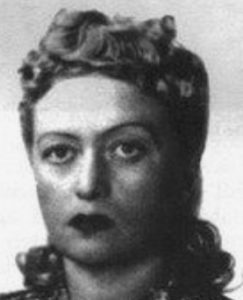Israel’s Hasidic National Poet
 Shaina Zelda Schneersohn (1914-1984) was born in what is now Ukraine, then part of the Russian Empire, to a religious family of Chabad Hasidim. She was a first cousin of the Lubavitcher Rebbe. An only child, she made aliyah with her parents when she was 12. The family settled in Jerusalem, where Zelda went on to study at the city’s Bezalel Academy of Arts in the hopes of being a professional painter. She ultimately became a teacher and taught at school in Tel-Aviv, Haifa, and Jerusalem. (One of her students was renowned writer Amos Oz). Meanwhile, she wrote poems and essays for local newspapers, and slowly gained a large following of fans. After marrying Hayim Mishkovsky, Zelda became a full-time writer and poet. She published her first collections of poems in 1967, blending themes from both Israel and Russia, infused with religious symbols and mystical concepts from Kabbalah and Hasidism, often mixing Modern Hebrew with Biblical Hebrew and Yiddish. The poems were hugely popular across Israel’s social, political, and religious spectrum. She went on to publish five more collections of poetry over the next two decades, each reaching bestseller status. She became affectionately known in Israel simply as “Zelda”, going on to win the Brenner Prize in 1971, and the Bialik Prize in 1978. Her poem “Each Person Has a Name” is publicly recited in Israel on Holocaust Remembrance Day (which also happens to be her yahrzeit). Like her cousin the Lubavitcher Rebbe (with whom she kept a regular correspondence), Zelda never had children, but had many devoted students and foster daughters that she took into her home. She is recognized today as one of Israel’s greatest poets.
Shaina Zelda Schneersohn (1914-1984) was born in what is now Ukraine, then part of the Russian Empire, to a religious family of Chabad Hasidim. She was a first cousin of the Lubavitcher Rebbe. An only child, she made aliyah with her parents when she was 12. The family settled in Jerusalem, where Zelda went on to study at the city’s Bezalel Academy of Arts in the hopes of being a professional painter. She ultimately became a teacher and taught at school in Tel-Aviv, Haifa, and Jerusalem. (One of her students was renowned writer Amos Oz). Meanwhile, she wrote poems and essays for local newspapers, and slowly gained a large following of fans. After marrying Hayim Mishkovsky, Zelda became a full-time writer and poet. She published her first collections of poems in 1967, blending themes from both Israel and Russia, infused with religious symbols and mystical concepts from Kabbalah and Hasidism, often mixing Modern Hebrew with Biblical Hebrew and Yiddish. The poems were hugely popular across Israel’s social, political, and religious spectrum. She went on to publish five more collections of poetry over the next two decades, each reaching bestseller status. She became affectionately known in Israel simply as “Zelda”, going on to win the Brenner Prize in 1971, and the Bialik Prize in 1978. Her poem “Each Person Has a Name” is publicly recited in Israel on Holocaust Remembrance Day (which also happens to be her yahrzeit). Like her cousin the Lubavitcher Rebbe (with whom she kept a regular correspondence), Zelda never had children, but had many devoted students and foster daughters that she took into her home. She is recognized today as one of Israel’s greatest poets.
Purim Begins This Saturday Night – Chag Sameach!
3 Quran Verses Every Jew Must Know
Words of the Week
We are immersed in an evolving, ongoing conflict: an Information World War in which state actors, terrorists, and ideological extremists leverage the social infrastructure underpinning everyday life to sow discord and erode shared reality.
– Renée DiResta


